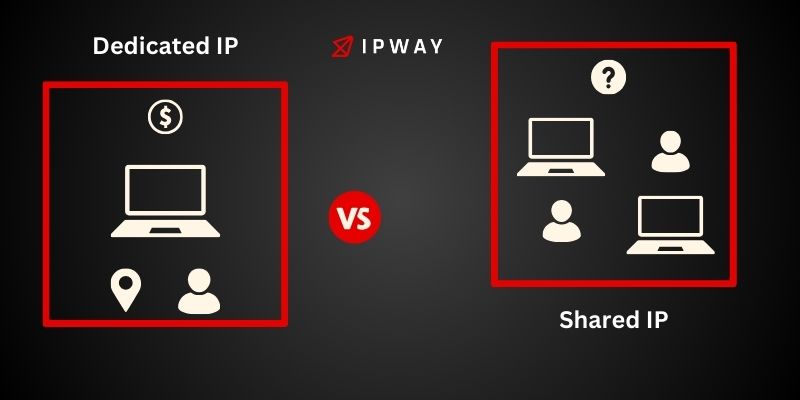In todays changing digital world the difference between having your own dedicated IP address and sharing one with others has become more important.
When businesses and individuals aim to improve their visibility boost security and guarantee that emails reach their recipients deciding between these two kinds of IP addresses can be crucial. Knowing the details about IPs versus shared IPs is key, to making a smart choice that fits your unique requirements and goals.
This detailed article examines the core distinctions between IP addresses and shared IP addresses delving into their pros, cons and suitable applications. By the conclusion of this guide you’ll grasp the specifics of each IP type and its potential effects, on your activities.
What is an IP?
Every device connected to the internet is assigned an identifier known as an Internet Protocol (IP) address. This unique string of numbers such as 192.168.1.1 serves as an address for your device enabling it to interact with other devices and servers worldwide in a manner akin, to a postal address system.
There are two main types of IP addresses in use today:
IPv4 (Internet Protocol Version 4): An IP address serves as a label given to each internet connected device. It is represented by a series of numbers divided by periods (for example 192.168.1.1). Acts like a home address for your device enabling it to communicate with other devices and servers worldwide. The typical IPv4 format comprises four sets of numbers between 0 and 255 separated by dots. Despite its usage the availability of IPv4 addresses is shrinking due to the rapid increase, in internet connected devices.
IPv6 (Internet Protocol Version 6): IPv6 was created to overcome the restrictions of IPv4 by introducing a alphanumeric structure that greatly increases the number of IP addresses available. Despite the increasing use of IPv6 IPv4 continues to be the prevailing protocol, for now.
IP addresses play a role, in keeping the internet running smoothly by directing data packets between devices. Whenever you visit a website your devices IP address is utilized to link up with the server of the website enabling the exchange of information.
What is a Shared IP?
An IP address that is shared is one used by websites or domains at the same time. This arrangement is typical, in shared hosting settings, where multiple websites are hosted on a server to cut expenses and make better use of resources.
Advantages of Shared IP:
- Cost-Effective: Using an IP hosting service is cost effective since the expenses are divided among several users. This feature makes it a popular choice, for businesses, individual websites and startup ventures operating on tight budgets.
- Simplified Management: Web hosting companies usually oversee IP settings taking care of server upkeep, security upgrades and other technical tasks to make things easier, for the users.
- Resource Sharing: In a hosting setup the server distributes resources like CPU, memory and bandwidth among all websites. This approach helps keep expenses down while ensuring performance, for smaller sites.
Disadvantages of Shared IP:
- Potential for IP Blacklisting: Shared IP addresses pose a risk when it comes to the chance of getting blacklisted. If a website, on the server is involved in spam or other malicious activities it could lead to the IP address being blacklisted. This could impact the performance and trustworthiness of all websites that share the same IP address.
- Performance Variability: When multiple websites share server resources the performance of your website may be affected by the actions of sites on the server. If one site suddenly gets a lot of traffic or uses up a lot of resources it could cause delays, for sites that share the same IP address.
- Limited Control: With a shared IP, users have limited control over server settings and configurations. Hosting providers typically impose restrictions to ensure stability and security for all users, which can limit customization options for individual websites.
What is a Dedicated IP?
A dedicated IP address refers to an IP address that is specifically allocated to a domain or website. Unlike IPs a dedicated IP is unique, to one user providing advantages in terms of control, performance and security.
Advantages of Dedicated IP:
- Enhanced Security: Having a dedicated IP address lowers the chances of security threats. Being blacklisted since its not shared with other users. This is especially crucial, for companies that deal with information like online stores or banks.
- Improved Email Deliverability: Businesses that heavily depend on email marketing find a dedicated IP to be essential. By having an IP linked exclusively to your domain it decreases the chances of your emails being flagged as spam resulting in deliverability rates and more impactful communication, with your target audience.
- Direct Server Access: Having an IP enables users to reach their website directly using its IP address even if the domain name isn’t resolving properly. This comes in handy for tasks, like website management, troubleshooting, establishing FTP connections and configuring SSL certificates.
- Better Performance: Having an IP for your website gives it special access to the servers resources leading to quicker loading speeds and more reliable performance. This is particularly advantageous, for websites that experience levels of traffic or those running resource heavy applications.
Disadvantages of Dedicated IP:
- Higher Costs: The main downside of having an IP address is the expense involved. Since it needs its resources hosting with a dedicated IP is usually pricier compared to shared hosting choices. This could pose a concern, for small businesses or individuals operating on limited budgets.
- Maintenance Responsibility: Having control also means having more responsibility. People who have their dedicated IP address might need to handle tasks like overseeing and keeping up with their server setup, such, as installing security updates, software and solving issues. This may call for an understanding of technical matters.

Shared IP Address vs. Dedicated: Main Differences
Knowing the distinctions between shared and dedicated IP addresses is crucial when deciding on the best choice, for your requirements. Lets delve into the factors that set apart these two kinds of IP addresses.
Security
Ensuring security is crucial for any platform, particularly, for businesses that manage delicate customer information or facilitate financial dealings. The utilization of shared IP addresses poses a risk since the behavior of a single user can impact all websites linked to that IP address group.
To illustrate if one site engages in spamming or malicious practices, search engines and email services may blacklist the IP address. This scenario could significantly harm the credibility and performance of all websites associated with that IP address.
Security is essential for any platform, for businesses handling sensitive customer data or processing financial transactions. The use of shared IP addresses can be risky because the actions of one user can affect all websites connected to that IP address cluster.
For example if a website engages in spamming or malicious activities, search engines and email providers might blacklist the IP address. This situation could severely impact the reputation and functionality of all websites sharing that IP address.
Performance
The performance of a website is an aspect that sets apart shared and dedicated IP addresses. In shared hosting the servers CPU, memory and bandwidth are shared among all websites hosted on it. This sharing can cause performance problems particularly when some websites, on the server receive traffic or use up a lot of resources. As a result your website may experience loading times and reduced performance.
The difference between shared and dedicated IP addresses lies in how a websites performance’s affected. In shared hosting resources like CPU, memory and bandwidth are divided among all websites, on the server. This sharing can lead to performance issues especially when certain websites receive traffic or consume a lot of resources. Consequently your website could encounter loading times and diminished performance.
Email Deliverability
Ensuring that your emails reach their intended recipients is essential for businesses that depend on email marketing and communication. When using a shared IP address the deliverability of your emails may be influenced by the behaviors of individuals sharing the same IP. If another user, on the IP engages in spamming or other harmful activities it could lead to the entire IP address being flagged or blacklisted by email providers. As a consequence your emails might end up classified as spam or not reach their destination all.
Having an IP address comes with numerous benefits when it comes to email deliverability. Because the IP is linked exclusively to your domain you have authority, over your email reputation. This helps lower the risk of your emails getting flagged as spam and boosts the likelihood of your messages reaching the people you intended them for. For companies that heavily depend on email correspondence a dedicated IP can be extremely valuable.
Control and Flexibility
When deciding between a shared and dedicated IP address it’s crucial to think about control and flexibility. Shared IPs often come with restrictions imposed by hosting providers to maintain stability and security, for all users. This may restrict your ability to personalize server settings install software or modify your hosting environment in other ways.
On the hand having a dedicated IP provides users with more control and flexibility. They can customize their server environment to suit their requirements whether it be installing personalized software implementing specialized security measures or overseeing server resources. This kind of autonomy is especially beneficial for companies, with technical needs or those obligated to adhere to particular industry standards.
Direct Comparison of Shared and Dedicated IP Addresses
Lets take a look by comparing shared and dedicated IP addresses using various important measures:
| Features | Shared IP | Dedicated IP |
| Cost | Lower | Higher |
| Security | Risk of being affected by others’ actions | Enhanced security, no sharing with others |
| Performance | Can be slower, affected by other websites on the server | Better performance, dedicated resources |
| Email Deliverability | Potential risk of emails being marked as spam | Improved deliverability, associated solely with your domain |
| Control and Flexibility | Limited | Greater control, direct server access |
| Risk of IP Blacklisting | Higher | Lower |
Conclusion
Deciding between having an IP address or a shared one depends on what you need and value the most. Opting for a shared IP is cost effective, for small businesses or individuals who don’t need full control over their server. However it does pose some risks especially when it comes to security and ensuring emails are delivered successfully.
Using an IP address offers security boosted performance and improved email delivery. This proves advantageous, for businesses seeking online presence and enhanced control. Despite the associated costs the benefits of owning an IP often outweigh the additional expenses especially for companies relying heavily on their website and email communications.
When you grasp the variances, between using an IP and a shared IP address you’ll be able to choose wisely based on your business objectives and technical needs. Whether you value affordability, autonomy or efficiency selecting the appropriate IP solution can greatly influence your achievements.
For more information on various proxies, check out our blog, where you’ll find articles like ISP vs. residential proxies.
